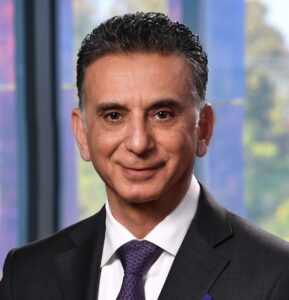Writer: Joey Garrand
5 min read June 2021 — Higher education in South Jersey is undergoing major shifts and transformations amid immense economic developments and tailwinds from the pandemic. To bring light to the future of higher education in South Jersey and the transformations that are taking place, Ali Houshmand, president of Rowan University, and Frederick Keating, president of Rowan College of South Jersey, discussed in their interviews with Invest: their priorities and vision for the future.
What is your institution focused on at this moment?
 Ali Houshmand: Our academic environment, infrastructure plans, financials, technology and equity efforts are all undergoing immense transformation. We are changing in so many ways, pivoting to pursue and implement new opportunities while also dealing with a variety of challenges the pandemic has presented or accelerated.
Ali Houshmand: Our academic environment, infrastructure plans, financials, technology and equity efforts are all undergoing immense transformation. We are changing in so many ways, pivoting to pursue and implement new opportunities while also dealing with a variety of challenges the pandemic has presented or accelerated.
We are rethinking nearly $300 million of infrastructure projects, two of which are major housing projects consisting of a total of 1,400 beds. We have frozen those projects to restrategize. Technology has become the frontrunner, and we are investing millions of dollars into cloud computing and technological capabilities.
We’re also investing heavily in our efforts to level the playing field for disadvantaged students. Starting this fall, any student who comes to Rowan University and has a family income of less than $45,000 will attend for free, for all four years. Starting next fall 2022, anyone who is up to $65,000 in family income will get two years of their education at Rowan University paid for by the state and Rowan University. If they go to a community college for the first two years, they’ll get all four years for free.

Frederick Keating: We’ve recently submitted the application, alongside competition throughout the region, to become the workforce training center for the wind industry. We are trying to anchor our position in the WIND Institute of New Jersey to capture a piece of the emerging industry.
We feel that our application has substantial promise of being accepted, thanks to the industry and educational advantages available in our region. We have the port in Paulsboro and the EEW-Ørsted manufacturing facility in our area, so we are in the heart of the geography. We’re now shifting our career tech division to match the workforce demand of the trades in the wind industry. Rowan College of South Jersey has expanded its instructional outreach to include the adult night schools of both Cumberland Vo-Tech and Gloucester Vo-Tech. In those trades, we can bring welding, carpentry and electrical up to a junior college level of training in partnership with our tech schools.
We are developing a sixth division of Rowan College of South Jersey, Career Tech Education. We are widening our base in anticipation of wind and other considerations of labor coming at us with the demand from the technical, logistics, food and component parts segments that would be more trade driven. These are credentials — which can be acquired in two years with embedded certificates of industry value — that would give the workforce a jump in the industries we want to push out in. I see wind, food and healthcare being the main industries we cater to.
In what ways do you hope to foster partnerships and collaboration in higher education?
Houshmand: The potential for partnerships between Rowan University and the local healthcare industry is monumental. There are enormous opportunities to combine our resources for joint research to create intellectual capital, which could lead to the formation of companies and subsidiaries as a result. As such relationships grow, the local economy benefits and grows from the increased activity.
The core mission of our education system is to create and impart knowledge. Everything else is a business that can be done by others much more efficiently. This is the direction higher education needs to go because we simply no longer can afford the current path. Up until now, any time higher education institutions were short of capital, either the state or increased tuition filled those needs. Higher education wasn’t looking at the expense side of the ledger; we always focused on the revenue side. So, we never learned to manage higher education institutions like a business, and now we have to. That is an opportunity. It will allow the creation of all sorts of entities that will feed into the economy and reshape the region.
Keating: We’re all chasing each other, which is a mistake. There should be consolidation of effort geographically and academically. We could do it through niche programming by demand of the area. If there was consolidation in the South Jersey education system, we would become one-stop shopping for incoming students. New Jersey’s education model is still very singular, unlike other states, such as Florida and California, and I think that’s our shortcoming.
What is your outlook for your institution and higher education in South Jersey?
Houshmand: We are on the edge of everything that is great. In South Jersey, we have over 900,000 acres of affordable land, are in great proximity to major metros and have access to rails, highways, airports and any mode of transportation that is desired. We’re surrounded in a 50 miles radius by over 100 institutions of higher education, tens of major healthcare providers that are among the best in the world and 50 million people. I see all of this as an opportunity. I’m looking forward to exploring each and every opportunity available.
Keating: The higher education sector is shifting. There will be more regionalization and mergers. Four-year universities will be joining together, two-year colleges will also be merging, as well as two and four years. I hope guidance for this idea of a new landscape is forthcoming. South Jersey is going to be in a unique situation because we have quality but lack quantity. We have to do more to increase seat capacity. We can do that through developing online campuses as well as upper-level master’s, graduate and doctoral-level programs.
Over the next year and a half or so, the higher education system will be determining whether we can do more regionally in South Jersey as a conglomerate or consortium. Some of this activity will be driven by economics, while some institutions will benefit by merging. The demographics of the entire Northeast Corridor are shrinking and we simply can’t keep this many institutions healthy.
Every college is in retreat. They’re all looking at their own situation, inside their walls. To survive, we have to reconnect and communicate on where demand is and where we can provide the best opportunities and value.
For more information, visit:
***Rowan University and Rowan College of South Jersey are independent institutions, but have partnered to offer high-quality, affordable pathways to a variety of degree and certificate programs. Their first of its kind 3+1 degree program allows students to earn a four-year degree for approximately $25,000.
